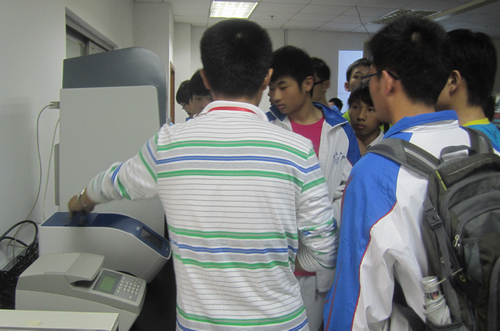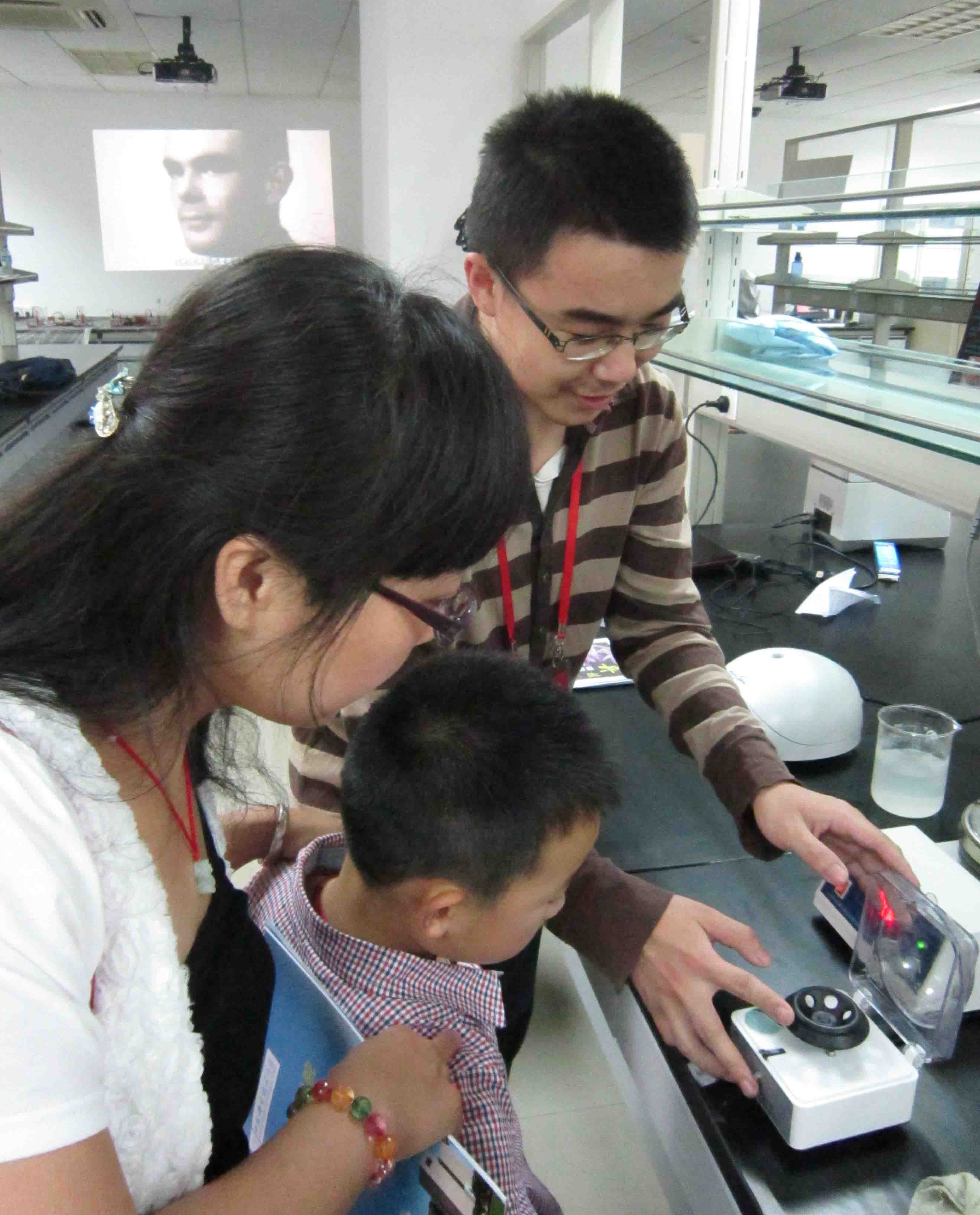Team:USTC-China/openday
From 2012.igem.org
| Line 129: | Line 129: | ||
<a href="https://static.igem.org/mediawiki/2012/d/d6/Openday_7.JPG"><img src="https://static.igem.org/mediawiki/2012/d/d6/Openday_7.JPG" alt="Openday_7" style="clear:both;width:350px;height:252px;"></a><br><small align="center">Our team member Qian Li is introducing the Gel Image System.</small></div> | <a href="https://static.igem.org/mediawiki/2012/d/d6/Openday_7.JPG"><img src="https://static.igem.org/mediawiki/2012/d/d6/Openday_7.JPG" alt="Openday_7" style="clear:both;width:350px;height:252px;"></a><br><small align="center">Our team member Qian Li is introducing the Gel Image System.</small></div> | ||
<div class="imgholder1" align="left" style="float:left;width:350px;height:auto;"> | <div class="imgholder1" align="left" style="float:left;width:350px;height:auto;"> | ||
| - | <a href="https://static.igem.org/mediawiki/2012/ | + | <a href="https://static.igem.org/mediawiki/2012/1/15/Openday_8.jpg"><img src="https://static.igem.org/mediawiki/2012/1/15/Openday_8.jpg" alt="Openday_8" style="clear:both;width:350px;height:252px;"></a><br><small align="center">Our team member Wuyang Chen is demonstrating the usage of the micropette plus.</small></div> |
| - | + | <div class="imgholder1" align="left" style="float:left;width:350px;height:auto;"> | |
| - | + | <a href="https://static.igem.org/mediawiki/2012/7/7b/Openday_9.JPG"><img src="https://static.igem.org/mediawiki/2012/7/7b/Openday_9.JPG" alt="Openday_9" style="clear:both;width:350px;height:252px;"></a><br><small align="center">Children are playing with their moms behind.</small></div> | |
| Line 149: | Line 149: | ||
| - | |||
</div><!--the centercontent--> | </div><!--the centercontent--> | ||
| Line 191: | Line 190: | ||
<p class="level1"><a href="https://2012.igem.org/Team:USTC-China/protocols">Protocols</a></p> | <p class="level1"><a href="https://2012.igem.org/Team:USTC-China/protocols">Protocols</a></p> | ||
| - | + | Jjj | |
<p class="level1"><a href="https://2012.igem.org/Team:USTC-China/groupmeetings">Group meetings</a></p> | <p class="level1"><a href="https://2012.igem.org/Team:USTC-China/groupmeetings">Group meetings</a></p> | ||
Revision as of 09:56, 22 September 2012
OPEN DAY
We conducted the visiting activity in our Synthetic Biology Lab as part of the “Open Day of Biox ” program during the Week of Science of USTC(from 19th May to 20th May), which is an annual event aimed at promoting the spread of science. It is an unusual chance for the public to get to know what science really is. During these days many labs in our school will be accessible for people outside our campus and volunteers majoring in certain fields will be there Sequence_of_toggle_switchas instructors. Our institute served moe than 6000 people in two days this year.
Who come to Open Day?
This "Week of Science" program is annually held in USTC under the instruction of the Ministry of Science and Technology of the People's Republic of China. With no limitations to our campus and part of our labs, people from outside our school can enjoy their journey of science freely. Thus a great range of people, from kids to the elderly are involved in our program. Especially, students from primary schools and high schools in Anhui province of China were well organized by their teachers. Many of them traveled a lot to get to our campus.

Our team member JinXin Wang is introducing PCR for students from Lujiang Middle School Anhui Province.(picture from Lujiang Middle School)
What do we do?
After applying to the School of Life Sciences, we are part of the Week of Science of USTC activity. Since our lab is open to the public, we have the chance to reach people from different backgrounds and ages. That is, we gain a wonderful opportunity to make synthetic biology know by more people. Various of sections are designed for people from different ages to better demonstrate what synthetic biology is. The whole process consists of videos&explanations, forums&lectures, panels&presentations, introductions of equipments and games&interactions.
Movies about the central dogma and genetic engineering are played on a continuous loop during the opening time, providing the visitors a vivid image of synthetic biology. Lectures concerning on biobricks and iGEM are given when adults and students from high schools enter, they are considered to be able to further understand the details of synthetic biology. Panels are placed aside the passage way, and when the visitors come by, USTC iGEMers will be there instructing. The characters and usages of equipments such as the PCR instrument, the centrifuge, the micropette plus and the Gel Image System which are available in our lab are explained by our team members. Taken the safety of the visitors into consideration, we keep warning them to stay away from our equipments. For kids who may have difficulty in understanding the lecture and movies, we set up a game zone where building blocks and paper DNA models are used to make it easier to understand the basic idea of synthetic biology.
In the end

CI dimers bound cooperatively to adjacent operator sites in OR and OL. The CI dimers are shown in blue. Each subunit of the dimer consists of an N-terminal DNA-binding domain (N), a C-terminal oligomerization domain(C), and a linker region (black) connecting the two. The dimer pair bound cooperatively at OR1 and OR2 represses transcription from PR and the dimer bound at OR2 also activates transcription from PRM. The dimer pair bound cooperatively at OL1 and OL2 represses transcription from PL.

CI dimers bound cooperatively to adjacent operator sites in OR and OL. The CI dimers are shown in blue. Each subunit of the dimer consists of an N-terminal DNA-binding domain (N), a C-terminal oligomerization domain(C), and a linker region (black) connecting the two. The dimer pair bound cooperatively at OR1 and OR2 represses transcription from PR and the dimer bound at OR2 also activates transcription from PRM. The dimer pair bound cooperatively at OL1 and OL2 represses transcription from PL.
During the Week of Science our team have served enormous number of people outside our campus. We believe that people who ever come to our lab will be impressed by the magic of synthetic biology. Visitors can get a picture of the basic principles of synthetic biology and pick up some tips for the equipments. We feel happy to find that people are curious about our lab and strongly interested when we are introducing. It is axiomatic that our work is of great significance to the outreach of Synthetic Biology. And we enjoy our volunteering very much!
 "
"









